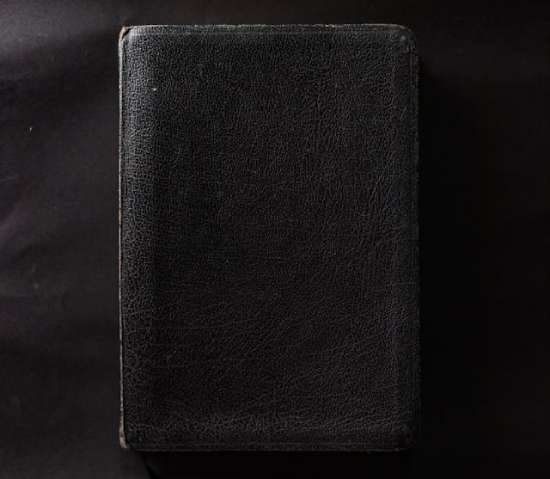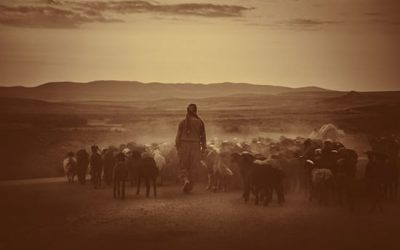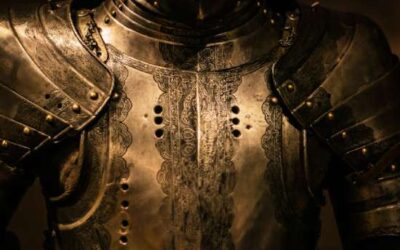Times of crisis call for men and women of action. The Israelites, newly settled in the Promised Land, found themselves in those times. As enemy nations attacked and oppressed the tribes, they cried out to God for help. He, in turn, sent them men and women of action—known as judges.
The book of Judges in the Old Testament tells the stories of these judges. The accounts, though, are not happy bedtime stories. Instead, they show the darker sides of human nature and the corruption taking place in ancient Israel at the time.
But they still teach us important lessons and reveal the patient and merciful character of God.
Let’s uncover those lessons as we answer the following questions:
- What was a judge in the Old Testament?
- Why is an entire book of the Bible devoted to the judges?
- Who are the 12 judges of Israel?
- How did God use the judges?
What was a judge in the Old Testament?
Today, we think of judges as individuals in court who handle cases and administer sentences. But in the book of Judges in the Bible, they were people God raised up to govern the Israelite tribes and when the situation called, lead them into battle against hostile nations (Judges 2:16–18). Their duties had to do more with military matters than judicial ones.
The Hebrew word for “judges” in the Old Testament is shophet. It means “bringer of justice.”1
Interestingly, Judges 11:27 refers to God Himself as shophet. He is the ultimate Judge. The judges He appointed were simply tasked with bringing His justice to other nations.
Where did this role come from?
The concept of a judge originated with Moses, who handled disputes between the people (Exodus 18:13). When the task became too great for one person, he delegated authority to judges over smaller groups of people within Israel (verses 25–26). These judges were like regional officers that dealt with minor matters related to the law (Deuteronomy 16:18; 17:9).
In the book of Judges, though, God chose special judges whose purpose was to overcome Israel’s enemies.
How was a judge different from a king?

Photo by Mike B
Though the judges had some administrative authority, they were different from kings because their position was not hereditary, like a monarchy. They didn’t get to choose who came after them, either.2
Judges also didn’t have the same privileges as kings. Rather, they were often common men with ordinary lives. Kings could demand servants, land, and wealth (1 Samuel 8:10–18), but the judges didn’t receive economic benefits from their roles.
How was a judge different from a prophet?
Prophets in the Bible received messages from God to give to the people (2 Chronicles 36:15; Amos 3:7). This gave them religious authority, but not civil or military authority. Compared to prophets, the judges had a much more active role in the military affairs of Israel.
However, on some occasions, God appointed individuals to hold both roles. Two examples are Deborah (Judges 4:4) and Samuel (1 Samuel 3:20).
How did God choose the judges?
We don’t know much about how God chose most of the judges. Aside from the angel of the Lord appearing to both Gideon and the parents of Samson (Judges 6:11; 13:1–5), we only know that God “raised” up deliverers or they “arose.”3 But looking at the majority of the judges’ stories, there are some similarities in the qualities God was looking for:
- Humility
- A willingness to submit to His Spirit’s leading
Instead of choosing people that were popular and confident, God used people who distrusted themselves and weren’t afraid to lean on Him.
For example, Gideon felt small for the task God had given him (Judges 6:15). And Jephthah was the son of a prostitute and a social outcast (Judges 11:1–3).

Photo by Emiliano Orduña on Unsplash
But it was this humility that allowed God to work His miracles. The judges were willing to submit to His Spirit, without letting their egos get in the way.4
And when God’s Spirit is at work, the victory comes from Him instead of human strength (Zechariah 4:6).
In the case of Gideon, God asked him to step out in faith by preparing an army and following His instructions. As Gideon cooperated with God, his small army overcame the Midianites (Judges 7).
In other cases, God appointed people with skills related to their calling. In fact, Othniel had conquered a city occupied by giants (Joshua 15:13–17), and Jephthah was a mighty warrior (Judges 6:12; 11:1).
Nevertheless, God values a willing and surrendered heart above all else. He needed judges who would look to Him and use their strengths for His glory.
Why were the judges needed?
The judges in the Old Testament came on the scene after the deaths of Moses and Joshua— a time when the Israelite people became rebellious, neglecting God’s covenant and becoming enamored with other gods (Judges 2:7–13). Without God’s blessing and guidance, they compromised many of their values. This made them vulnerable to be conquered by the surrounding nations.
As they cried out to God for help, He appointed deliverers—judges—for them. These judges provided leadership, organization, and military order (Judges 2:16–18).
What was the covenant that the Israelites had broken?
God had promised them that if they remained faithful to Him and drove out the Canaanite nations, He would bless them with victory (Deuteronomy 11:22–25).
But if Israel failed to do so and began to mingle with the Canaanites, adopting their corrupt, self-serving beliefs and practices, then those Canaanite nations would overcome them (Joshua 2:11–13).
Sadly, the latter scenario occurred in a cycle:
- The Israelites turned from God.
- Enemy nations came and conquered them.
- The Israelites cried out to God for help.
- God sent them a judge to deliver them.
Unfortunately, once victorious, the Israelites again fell into corruption and sin, and the cycle repeated itself.
These stories sure tell us a lot about our fickle human nature.
Why is an entire book of the Bible devoted to the judges of Israel?
Here are several reasons:
1. It provides a historical record

Photo by Luis Quintero
The book of Judges shows us what happened to God’s people after they settled in the Promised Land of Canaan. This record stretches from the death of Joshua to the time of Samuel.
2. It shows us the results of disobeying God
Many times, the book of Judges mentions how “everyone did what was right in his own eyes” (Judges 21:25, ESV). Without God’s instructions as their standard, it became all too easy to chase after their own selfish whims. Corruption became rampant, and even civil war broke out among the Israelite tribes (Judges 9, 20).
3. It gives us the backdrop to the Israelites’ demand for a king
When the people turned from God as their ruler, chaos resulted. Thus, they thought that having a king would solve their problems.
But that wasn’t the real solution. Leaving their selfish ways behind and coming back to God was.
Unfortunately, the Israelite people didn’t fully understand this. Instead they kept comparing themselves to the neighboring nations. So they demanded an earthly king to lead their armies and fight their enemies (1 Samuel 8:19–20).
4. It shows us God’s incredible mercy
Despite how many times His people turned from Him, God didn’t give up on His people. He heard their cries and sent them deliverers. Their suffering grieved Him and moved Him to action (Judges 10:16).
5. It demonstrates what God can do with ordinary, flawed people
The judges often didn’t have special qualifications or skills—most of them were simply willing to follow God’s plan.
Sometimes, though, they allowed pride and selfishness to get in the way so that God could not fully work through them.
And even then, God still used them as much as He could.
Who are the 12 judges of Israel?
The book of Judges mentions 12 individuals who delivered the Israelites from their enemies. They are divided into major and minor judges by how much the Bible says about them. The major judges are Othniel, Ehud, Deborah, Gideon, Jephthah, and Samson. The minor judges are Shamgar, Tola, Jair, Ibzan, Elon, and Abdon.
These judges lived within a period of about 350 years.5
Some of them overlap with one another because they were in different regions, fighting different enemies.6 Thus, they didn’t follow each other in a sequence, as it might appear from a quick glance at the book.
But we’ll learn about them in the order that the Bible lists them.
1. Othniel (Judges 3:9–11)
After the Israelites had been in bondage to a king of Mesopotamia for eight years, they cried out to God who appointed a leader named Othniel.
Othniel was from the tribe of Judah. His name, which means “lion of God,”7 is fitting since he had conquered a Canaanite city that was occupied by giant people (Joshua 15:13–17; Judges 1:12–13).
2. Ehud (Judges 3:15–30)

Photo by Anis Rahman on Unsplash
God raised up Ehud of the tribe of Benjamin to deliver the Israelites from Moabite oppression. He carried out a secret assassination of King Eglon of Moab and then rallied the Israelites to spring a surprise attack on the Moabites.
The Bible mentions something unique about Ehud:
He was left-handed.
And Ehud used that to his advantage on his secret mission. He hid a dagger under his clothes on his right side so that he would be able to pull it out with his left hand. Apparently, the court guards didn’t think to check there!
Thus, Ehud’s assassination attempt was successful, and Israel was victorious…
…at least for a time.
3. Shamgar (Judges 3:31)
Shamgar gets one verse of recognition in the Old Testament for delivering Israel from the Philistines. His feat? He killed 600 men with a cattle prod—a long stick with a pointed end that was used for cattle herding.
Shamgar’s tribe is not mentioned. But some scholars believe that he may have been a non-Israelite since his name is not Hebrew.8 This reminds us that God can use anyone who is faithful to Him.
4. Deborah (Judges 4–5)
Deborah of the tribe of Ephraim gets the credit for being the only female judge, as well as one of the few female prophets (Judges 4:4). She supported Barak of Naphtali in leading an army to defeat the Canaanite king Jabin and his commander Sisera.
Deborah is also the only one in the book of Judges that seems to be performing a truly judicial role. Judges 4:5 says,
“She used to sit under the palm of Deborah…and the people of Israel came up to her for judgment” (ESV).
Her spirituality and wisdom earned her the title “mother in Israel” (Judges 5:7, NKJV) and brought peace to the nation for 40 years.
5. Gideon (Judges 6:11–8:28)

Photo by Aziz Acharki on Unsplash
God appointed Gideon of Manasseh to deliver the Israelites from Midianite oppression. God helped Him do so with only 300 men, who entered the enemy camp in the middle of the night, blew their trumpets, and smashed jars that contained bright torches. The whole Midianite camp fled in confusion (Judges 7:19–25).
Gideon is also known for finally destroying idols and altars to the false gods Baal and Asherah, that were set up by people in his own tribe.
6. Tola (Judges 10:1–2)
Little is said about Tola, except that he came from the tribe of Issachar. God raised him up to save Israel, and he judged the nation for 23 years.
7. Jair (Judges 10:3–5)
Jair, whose name meant “God enlightens,”9 was from the tribe of Manasseh. God appointed him to judge Israel for 22 years. His claim to fame was that he had 30 sons, who rode on 30 donkeys and had 30 cities.
8. Jephthah (Judges 11:5–12:7)
The elders in Israel summoned Jephthah—also from the tribe of Manasseh—to help them during a time when the Ammonites were oppressing the Israelites. First, Jephthah attempted diplomacy, but when that failed, he took an army against the Ammonites and God led them to gain victory over them.
9. Ibzan (Judges 12:8–10)
Ibzan of Judah judged Israel after Jephthah, though we don’t know if he made any military conquests during those seven years. He also had 30 sons, as well as 30 daughters. It’s also mentioned that each of his children married people outside of his tribe (Judges 12:9).
10. Elon (Judges 12:11–12)
Elon’s name means “oak” tree and may have indicated his strength.10 He was from the tribe of Zebulun and judged Israel for ten years.
11. Abdon (Judges 12:13–15)
Abdon, from the tribe of Ephraim, judged Israel for eight years. Like Ibzan and Jair, he had a large family—40 sons and 30 grandsons—and he might have been quite wealthy since they rode on 70 donkeys.
12. Samson (Judges 13–16)

Photo by Christina Rumpf on Unsplash
Samson, of the tribe of Dan, was called from birth to deliver Israel from the Philistines (Judges 13:2–24). As a part of his calling, God blessed him with unusual strength.
The secret of his strength?
His vow of dedication to God, symbolized by his long hair. Some of his feats included:
- Tearing a lion to pieces (Judges 14:6)
- Killing 1,000 Philistines with a donkey’s jawbone (Judges 14:15)
- Carrying the gates of a city up a hill (Judges 16:3)
- Pushing down the main pillars of the Philistines’ temple of Dagon, killing 3,000 Philistines and himself
Other judges
Israel had a few more judges, who are mentioned in other books of the Bible. Moses (Exodus 18:13, 16) was the first judge. The rest, who emerged around Samson’s time, include:
- the priest Eli (1 Samuel 1:9)
- the prophet Samuel (1 Samuel 7:15–17)
- Samuel’s sons (1 Samuel 8:1–5)
Because Samuel’s sons were so corrupt, the Israelites asked God to appoint them a king instead (1 Samuel 8:1–5). Thus, the time of the judges came to an end.
And speaking of corruption, Samuel’s sons were not the only ones who struggled. Many of the judges had major flaws. It’s a wonder that God was able to use them!
How did God use the judges despite their faults?
It only takes a glance at the judges’ lives to realize that many of them were pretty messed up. Their poor choices no doubt affected their success. But God still used them. He placed His Spirit upon them and worked with them where they were at.
Here are some examples:
- Gideon was a coward. God knew this struggle and answered his request for signs to confirm his calling (Judges 6:17-21), which includes the well-known story of “putting out the fleece” (Judges 6:36-40). As Gideon’s faith grew, God tested him while continuing to assure him (Judges 7:9-14).
- Jephthah made a rash vow, promising that if God gave him victory, he would sacrifice whatever came out his door to meet him. The vow was completely unnecessary because God had already promised him victory in the war (Judges 11:24, 27). By his vow, Jephthah showed that he didn’t understand God’s character. He viewed God more like the Canaanites viewed their gods—as a deity that needed to be appeased. Nevertheless, God gave Jephthah military success.
- Samson was impulsive and promiscuous (Judges 14:1–3). But God even used his flaws to bring judgments on the Philistines. God was patient with Samson and didn’t take away his strength until Samson allowed his hair—the symbol of his commitment to God—to be cut. At the end of his life, when Samson humbled himself, God strengthened him one last time. Then he sacrificed himself to take out the “lords of the Philistines” by collapsing an entire house on all of them (Judges 16:27-30).
Please note:
This doesn’t mean that God endorsed wrong behavior. Rather, God worked with what was available to Him.
And here’s the lesson for us:
No matter who we have been, God wants to use us if we’re willing to be led by Him.
That’s why these stories are here. When we feel like failures, these stories give us the courage to keep moving forward in following Jesus.

Photo by Gift Habeshaw on Unsplash
If God could use the judges, He can use you
The Old Testament stories of the judges take a deep dive into the tragedy and violence that result when people turn from God. It’s tempting to skip over these stories for something more positive elsewhere in the Bible, but remember:
The book of Judges is important for us.
Like the Israelites, we live in a world that needs God. And through the stories of the judges, we find principles that help us navigate the challenges we face today.
We can see the consequences of ignoring God’s will. We can learn from the mistakes of the judges. And most importantly, we can get a glimpse of God’s incredible mercy that uses us despite our faults.
Want to learn more about how the Bible stories apply to your life?
- Constable, Thomas, “Judges,” Dr. Constable’s Expository Notes. [↵]
- Easton, Matthew George, ed., ”Judge,” Easton’s Bible Dictionary, 3rd ed., 1897. [↵]
- Judges 2:16, 18; 3:9, 15; 5:7; 10:1, 3 [↵]
- Judges 3:10; 6:34; 11:29; 13:25; 14:6, 19; 15:14 [↵]
- Swindoll, Chuck, “Judges,” Insight for Living Ministries, insight.org. [↵]
- Ibid. [↵]
- Gesenius, Wilhelm, and Samuel P. Tregelles, “Othniel,” Gesenius’ Hebrew and Chaldee Lexicon to the Old Testament Scriptures (Grand Rapids: Eerdmans, 1957). [↵]
- “Shamgar,” Holman Bible Dictionary. [↵]
- “Jair,” Gesenius’ Hebrew and Chaldee Lexicon to the Old Testament Scriptures. [↵]
- “Elon,” Gesenius’ Hebrew and Chaldee Lexicon to the Old Testament Scriptures. [↵]
More Answers
Who is Mary Magdalene in the Bible?
Mary Magdalene was a remarkably dedicated follower and supporter of Jesus Christ during His earthly ministry.
Getting to Know Mark—Gospel Writer and Follower of Jesus
Mark (whose full name was John Mark) had a lot of roles in the New Testament: he was an early follower of Jesus Christ, he traveled the Mediterranean as a Christian missionary, and he wrote a book of the Bible.
Understanding Luke: The Beloved Physician, Historian, and Evangelist
Who was Luke in the Bible? What was he known for and what contributions did he make for the early church? Find out here.
Exploring the Life of the Apostle Paul
The apostle Paul went from Pharisee to Christian after a miraculous encounter with Jesus. He spent the rest of his life spreading the Gospel and writing words we still read today.
All About the Disciple, Simon the Zealot
“Simon the Zealot” was one of the 12 disciples chosen by Jesus Christ. But despite this important role, the New Testament doesn’t provide specific details about his life, family, job, etc.
Judas Iscariot, the Most Infamous Disciple of Jesus
Judas Iscariot is best known for betraying Jesus with 30 pieces of silver. This page looks more closely at who he was and what led him to do so.
Who Is Thaddeus, the Disciple?
Thaddeus (or Thaddaeus) is one of the more unique and obscure figures among Jesus Christ’s disciples in the New Testament. Though we know little about him from the Bible or tradition, we do know that he went by a few names, specifically Thaddeus, Lebbaeus, and Judas of James.
Matthew—From Tax Collector to Jesus’ Disciple
In the first book of the New Testament, we find the Gospel story from the perspective of Matthew. He was a Jewish tax collector from Capernaum in the first century AD, and he was likely despised by fellow Jews for choosing that profession.
Who Was Jesus’ Disciple Named James, Son of Alphaeus?
Two of Jesus’ 12 disciples were named James. While more is known about James the son of Zebedee and brother of John, let’s see what there is to know about the other James, known as James the son of Alphaeus—also sometimes referred to as “James the Lesser.”
What the Bible Tells Us About Thomas the Apostle of Jesus
You might know him as “Doubting Thomas” because he refused to believe in Jesus Christ’s resurrection without first seeing Jesus.
All About the Disciple James, Son of Zebedee
James the son of Zebedee was a fisherman who became Jesus’ disciple. Discover how his decision to follow Jesus shaped his life and the beginnings of the early Church.
Who was the Apostle John?
What does the Bible say about the apostle John? What is he known for today? Learn more about John’s life, ministry, and legacy here.
All About Bartholomew, a Disciple of Jesus
Even before Bartholomew met Jesus, he was eagerly awaiting the arrival of the Messiah. Discover how he came to follow Jesus and what his discipleship means for us today.
What Do We Know About Andrew the Disciple?
Andrew was Jesus Christ’s first disciple (John 1:37-40) and the first to recognize Him as the Messiah.
Simon Peter: Fisherman to Disciple to Apostle
Simon Peter was a simple fisherman who became one of the most well-known disciples of Jesus Christ. He is perhaps best known for being part of Jesus’ inner circle of three disciples, walking on water, and proclaiming Jesus as the Son of God.
Who Was Philip the Disciple In the Bible?
Philip was one of the 12 disciples called by Jesus Christ during His earthly ministry. He was originally from the city of Bethsaida and to this day is often known as the “practical disciple.”
King David: How Was He a Man After God’s Own Heart?
War, bloodshed, murder, adultery—all of these crimes overshadowed the life of a biblical Old Testament man named David. Yet he was called a man after God’s own heart, not to mention one of Israel’s greatest heroes and kings.
The Story of Moses in the Bible: What His Life Teaches Us
A baby on death row, an outcast prince, a humble shepherd, and an unlikely deliverer. All these titles describe the individual that led Israel out of slavery in Egypt to the borders of the Promised Land.
The 42 Kings (and 1 Queen) of Israel and Judah in the Bible
Conspiracies, royal scandals, dictatorships—history is full of them. And Bible history is no different when we stop to look at the kings of ancient Israel in the Old Testament.
Who Were the Israelites in the Bible?
The Israelites in the Bible, also known as the children of Israel or ancient Israel, were a nation God called to represent Him to the world. As recorded in the book of Exodus, He delivered them from slavery in Egypt under Moses’s leadership and brought them to the Promised Land of Canaan (located in a similar area to present-day Israel).
What We Can Learn from the Life of Joshua
Joshua was an iconic leader in the Old Testament of the Bible. As a successor to Moses, he was both a humble servant of God and a strong warrior. God called Him to lead the nation of Israel to take possession of Canaan, the Promised Land—a task he took on with faith and courage.
Why is Abraham Important in the Bible?
God communicated directly with Abraham and made a covenant with him that would provide land, protection, and fruitfulness for his descendants. And he indeed became the father of many nations, making him a foundational figure in three monotheistic world religions: Judaism, Islam, and Christianity (Genesis 17:5, 19-20; Genesis 25:1-6, 12-18).
Life Lessons from Joseph in the Bible
Joseph is one of the more well-known people from the Bible’s Old Testament. He showed remarkable strength, faith, and patience—even while facing great difficulty and injustice. All because he let God lead.























